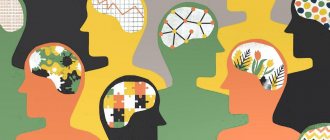What are factors of personality development in psychology
Personal development is a long process, during which the formation of physical and spiritual forces and the realization of a person in society occur. Spirituality, priorities and outlook on life depend on the conditions in which childhood and adolescence take place.
Factors of personality development are forces that promote the process of formation of an individual and help to develop in all spheres of life. From early childhood and throughout life, they influence a person through family upbringing and through the educational system.
What makes us us?
It is worth understanding that the factors that determine personality development are important in the process of self-improvement. It is impossible to achieve growth if even one of them suffers. That is, if you are in a bad team that negatively affects you, preventing you from achieving significant goals, then the question immediately arises: did you make the right choice?
Man makes his own way
In addition to supervision and training, it is very important that the individual himself wants to develop and strives to improve his existing skills. In most cases, he himself determines his future, constantly making choices. That is, a person chooses his political and spiritual preferences, hobbies and likes, this turns him into a person. And further factors and prerequisites for personal development help him in this.
Leading factors influencing a person’s personality
Positive character traits of a person - what applies to them
In sociology, personality is a set of important social qualities that characterize a person as a part of society. A developed person is the opposite of a mass personality; he is distinguished by the desire to move forward, the desire to achieve results.
Personality among the crowd
Factors are divided into external and internal. External ones are living conditions and relationships in society, internal ones are a person’s personal activity.
Among all the factors, the main ones are:
- Heredity is a set of skills that are passed on to a newborn from its parents. Each person has his own genotype, which determines hereditary predisposition;
- Education is a system of artificially instilled skills and abilities. The upbringing of the child in childhood and his desire to independently continue his development at a conscious age depend on the parents. This also includes pedagogical education at school, the formation of safe individual behavior;
- Environment is a set of conditions and circumstances under which a person grows, learns and interacts with his environment. The environment can be geographical - the boundaries of the country of residence, its climate and traditions. The home environment means the living conditions of an individual family, the social environment means the person’s environment.
Note! The hereditary factor influences life, but a person’s desire to succeed in any area can be stronger than genetics. For example, a hereditary predisposition to the exact sciences does not mean that a person will not be able to achieve success in creativity.
Heredity and environment in the development and formation of personality
The formation of personality traits is influenced by biological and social factors. The influence of heredity and environment is undeniable, since they are external and internal factors of development. They can also be called natural and social. Professors all over the world are struggling over which of them is the leading factor in personal development.
Heredity as a factor in personality development
What do we inherit from our parents, besides the color of our eyes, skin and hair? Is there a gene responsible for a child's future intelligence? Yes and no. We inherit only abilities for some type of activity (sports, languages, creativity), but not ready-made data with the help of which we can immediately turn from the cradle into a talented artist or a brilliant writer. These inclinations should be developed, the child should be provided with the right educational environment, then they will bear fruit. Otherwise, they will remain deeply hidden even from the owner of the abilities. The need for education and development is determined by the conditions for personal development.
Geneticist N.P. Dubinin insists that the level of intelligence is not transmitted from parents to children. This may upset academics, but it will give hope to those who have not even completed the school curriculum. However, the type of thinking is transmitted, without reference to the quality of thinking abilities.
Bad habits of mothers and fathers always affect their offspring: alcoholism, drug addiction, mental illness make their own negative adjustments to the inheritance of abilities and intelligence.
Environment as a factor in personality development
In addition to heredity, there are other factors that are important in the formation of a person. The influence of society on personal development is colossal. Everyone knows stories about “Mowgli” children who were accidentally found, living for years outside of society, far in the forests, fed by wolves and monkeys. They are not adapted to normal life; the degree of maturity remains at the level of 4-5 year old children even after many years of rehabilitation with special education teachers and psychologists.
A person constantly interacts with the society around him, such as friends, acquaintances, school, institute, work team. An individual cannot be formed without communication. As all school textbooks say: man is a biosocial being, nature and spirit are united in him. The lack of influence of communication on personality development is fraught with mental disorders.
In addition to providing learning conditions, communication allows a person to become mentally enriched. New knowledge cannot be obtained without dialogue with the intellectual property (oral or written) of another person.
The desire to interact with other people is ingrained in us from birth. First of all, the baby seeks contact with the mother: physical, visual, emotional. Without receiving a response to his needs, a newborn may withdraw into himself and lose trust in the world around him.
The environment, in addition to the social one, can be home (family). The family outlines the range of interests, shapes the values and moral qualities of a person. Here we are not talking about upbringing yet, only about the influence of the family on the development of the individual from the point of view of the environment:
- financial situation;
- psychological climate within a social unit;
- conditions for self-realization.
There is also a geographical environment (place of birth, residence of the individual), which takes into account:
- population density;
- climate;
- environmental conditions.
Notice how strikingly different the people of Norway are from the indigenous population of Zimbabwe, and not only in appearance.
The influence of social role on personality development is highlighted separately . It is important not only to be in society as such, but also the role that a specific person plays in this society: the father of a family or a bachelor, a director or a subordinate, a child or an adult man.
Each role influences in its own way, shaping the qualities of an individual that are necessary at a given moment of existence. Read in detail about relationships in family and society here.
The role of parenting
Causes of conflicts - the main factors that can influence this
Personality is always formed under the influence of many factors, but education plays the main role among them. It depends on the parents whether the child will be drawn to knowledge, his concentration and desire to explore the world. In early childhood, children begin to learn the rules and norms of behavior in society.
Family reading a book
Education can be spontaneous (chaotic) and purposeful. Spontaneous education is interconnected with everyday life; the child gains knowledge through trial and error. Purposeful education is an orderly process of teaching by parents and teachers with the goal of instilling in a child good manners, rules of behavior and life values.
What influences the success of the educational process in the family:
- Parental awareness is the main criterion for a successful process. Spouses must understand the goals and objectives of raising their child;
- Compliance of family education with the curriculum of kindergarten and school. Often, the desire of parents to instill positive qualities in their child coincides with generally accepted educational systems, but their actions must be parallel. For example, if rules of etiquette are taught at school, they should be practically reinforced at home;
- Family life and equality. Spouses must act together and raise the child according to the same rules. For example, if mom forbids eating sweets, but dad doesn’t, the child will not figure out what the right decision is and who is wrong. Mom will be strict for him, and dad will be kind;
- The ability of parents to combine love, respect and severity in their attitude. Strict upbringing forms complexes in a child, and constant affection and indulgence of all desires make him an egoist;
- The presence of parental authority in the eyes of the child. Children must respect their parents; for this, mom and dad must set a good example. Authority is formed when children see how their parents successfully combine work and social activities. Spouses should be interested in the child’s life; they can point out his mistakes and help correct them;
- Parents' relationships. Children should grow up in a family where spouses respect each other's opinions. Otherwise, the child will show disrespect towards peers and teachers.
Note! If a child has been abused by his father or mother, he may do the same to others in the future and become a criminal.
How socialization and environment influence
Types of communication in psychology - what they include, its functions
Socialization is the process of development of the human personality in accordance with the rules of behavior in society. The process of social formation begins in early childhood and stops when a person is able to take responsibility for his actions. This process does not end - throughout life the individual supplements and consolidates his knowledge.
Person in a team
Society forms social standards and stereotypes of behavior (at school, at college, at work); in order not to be left out, the individual must learn these rules. First, the individual acquires the general behavioral traits of the social group in which he is located. Over time, individual traits are developed that make it possible to realize the inclinations and opportunities inherent in his genotype.
Stages of socialization using the example of studying at the university:
- Adaptation. The teenager has found himself in a new environment and is learning the rules of behavior;
- Integration. Having understood the principles of work, the student joins the new team and undertakes to comply with the accepted rules;
- Self-development. Having got used to the new rules, the student begins to gain knowledge and develop;
- Self-regulation. The student independently controls his actions and progress.
The environment can have both positive and negative influences on an individual. For example, if a child with average performance is placed in a class with more developed children, his performance will increase in a short time. In the opposite situation, if a student ends up in a group of C students, he will stop studying and his performance will drop.
With age, a person is able to independently choose his environment if the previous environment does not suit him. What environmental characteristics help personality development:
- Success. It is a proven fact that people who achieve significant success inspire and force others to develop;
- Respect. It is impossible to develop if you receive insults from society. This rule works for school, work and family;
- High intelligence and level of culture. Having surrounded himself with smart and reasonable people, a person begins to look up to them and engage in his own development;
- Health. By surrounding himself with athletic and healthy people, an individual strives to maintain his physical shape. A smoker in the company of healthy people eventually begins to think about getting rid of the bad habit.
Note! Factors influencing the formation and development of a child’s personality largely depend on the parents. Children do not have the opportunity to choose their environment independently. They can choose who they interact with in class, but their parents choose which school they attend. You should pay attention to how your child is treated by his classmates and teachers.
Stages of development
An active and active person is capable of development. For each age period, one of the activities is leading.
The concept of leading activity was developed by the Soviet psychologist A.N. Leontyev, he also identified the main stages of personality formation. Later his ideas were developed by D.B. Elkonin and other scientists.
The leading type of activity is a development factor and activity that determines the formation of the individual’s basic psychological formations at the next stage of his development.
“According to D. B. Elkonin”
Stages of personality formation according to D. B. Elkonin and the leading type of activity in each of them:
- Infancy – direct communication with adults.
- Early childhood is an object-manipulative activity. The child learns to handle simple objects.
- Preschool age – role-playing game. The child tries on adult social roles in a playful way.
- Primary school age - educational activities.
- Adolescence – intimate communication with peers.
"According to E. Erickson"
Psychological periodizations of individuality development were also developed by foreign psychologists. The most famous is the periodization proposed by E. Erikson. According to Erikson, personality formation occurs not only in youth, but also in old age.
Psychosocial stages of development are crisis stages in the formation of an individual’s personality. The formation of personality is the passage of one after another psychological stages of development. At each stage, a qualitative transformation of the individual’s inner world occurs. New formations at each stage are a consequence of the development of the individual at the previous stage.
New growths can be both positive and negative qualities. Their combination determines the individuality of each person. Erikson described two lines of development: normal and abnormal, in each of which he identified and contrasted psychological new formations.
Crisis stages of personality formation according to E. Erikson:
- The first year of a person’s life is a crisis of confidence
During this period, the role of the family in the formation of personality is especially important. Through the mother and father, the child learns whether the world is kind to him or not. In the best case, basic trust in the world appears; if the formation of personality is anomalous, distrust is formed.
- From one year to three years
Independence and self-confidence, if the process of personality formation occurs normally, or self-doubt and hypertrophied shame, if it is abnormal.
- Three to five years
Activity or passivity, initiative or guilt, curiosity or indifference to the world and people.
- From five to eleven years
The child learns to set and achieve goals, independently solve life problems, strives for success, develops cognitive and communication skills, as well as hard work. If the formation of personality during this period deviates from the normal line, the new formations will be an inferiority complex, conformity, a feeling of meaninglessness, futility of efforts when solving problems.
- From twelve to eighteen years old
Teenagers are going through a stage of life self-determination. Young people make plans, choose a profession, and decide on a worldview. If the process of personality formation is disrupted, the teenager is immersed in his inner world to the detriment of the outer world, but he is unable to understand himself. Confusion in thoughts and feelings leads to decreased activity, inability to plan for the future, and difficulties with self-determination. The teenager chooses the path “like everyone else”, becomes a conformist, and does not have his own personal worldview.
- From twenty to forty-five years
This is early adulthood. A person develops a desire to be a useful member of society. He works, starts a family, has children and at the same time feels satisfied with life. Early adulthood is a period when the role of the family in the formation of personality again comes to the fore, only this family is no longer parental, but created independently.
Positive new developments of the period: intimacy and sociability. Negative neoplasms: isolation, avoidance of close relationships and promiscuity. Character difficulties at this time can develop into mental disorders.
- Average maturity: forty-five to sixty years
A wonderful stage when the process of personality formation continues in conditions of a full, creative, varied life. A person raises and teaches children, reaches certain heights in the profession, is respected and loved by family, colleagues, and friends.
If the formation of a personality is successful, a person actively and productively works on himself; if not, “immersion into himself” occurs in order to escape from reality. Such “stagnation” threatens loss of ability to work, early disability, selfishness and bitterness.
- After sixty years of age, late adulthood begins
The time when a person takes stock of life. Extreme lines of development in old age:
- wisdom and spiritual harmony, satisfaction with life lived, a feeling of its completeness and usefulness, lack of fear of death;
- tragic despair, the feeling that life has been lived in vain, and that it is no longer possible to live it again, fear of death.
When the stages of personality formation are experienced successfully, a person learns to accept himself and life in all its diversity, lives in harmony with himself and the world around him.
Is it possible to influence the formation process
The development of a child’s personality is the task of parents; they can influence the formation process. The character of the child and his personal development are influenced by the behavior of the parents, how they talk to him, whether they scold him or not.
From 2 to 7 years old, children begin to interact with peers and teachers. From 7 to 18 years of age, parents continue to raise the child, control his environment so that he grows up to be a full-fledged and educated person.
Baby climbing up books
At a conscious age, a person can independently influence his development, provided that he had the right upbringing. Heredity cannot be changed, but its negative manifestations can be fought, and its positive manifestations can be used to your advantage. His well-being, health and level of intelligence completely depend on a person.
Note! Children with congenital abnormalities and brain disorders develop individually.
Health problems can hinder a child's development, even if he grows up in a favorable environment.
At what age does personality development occur?
Psychologists say that a person develops unevenly at different periods of life. Up to a certain age, children actively learn new things, after which their development slows down.
How development changes at different ages:
- In preschool age, the child learns general knowledge from parents and educators, which will serve as the basis for further development;
- At the age of 6-16 years, a child is influenced by all factors in the formation of a full-fledged personality; upbringing and socialization play the main role. Beliefs, personal opinions and outlook on life are formed;
- From 17 to 26 years of age, maximum receptivity to learning, the ability to analyze and draw conclusions are observed. It is at this age that a person receives higher education in the chosen field of activity;
- Between 26 and 30 years, processes slow down, a decline in attention and memory loss are observed;
- By the age of 30-34, a new leap in development may occur, when a person begins to master his chosen profession in practice, his brain is actively working;
- At 35-40 years old, the individual continues to develop according to the same pattern, but at a slower pace;
- After 40 years, the level of thinking, memory and attention decreases.
Note! Age cannot limit personal desire. Some people actively develop from 18 to 25 years old, after which they decline. By the age of 30, some people find their place in life, change jobs and social circles.
Throughout their lives, people grow and gain new knowledge and skills. In pedagogy, the factors of development of a full-fledged personality are the driving forces that contribute to the realization of a person. A successful personality type is not inherited; human development is largely influenced by upbringing and environment.











